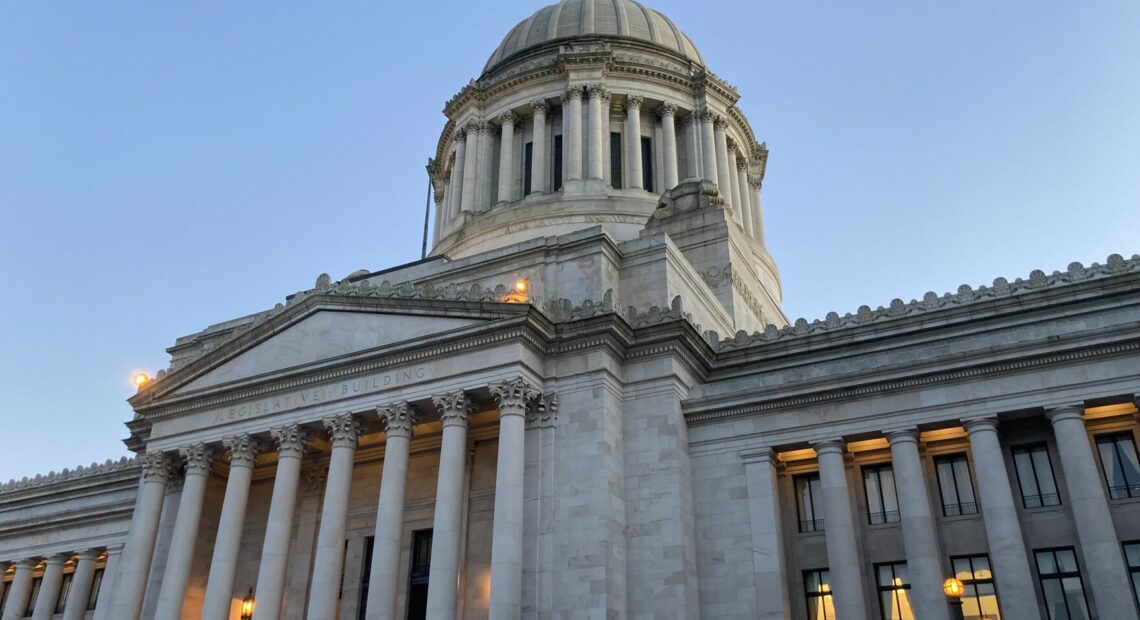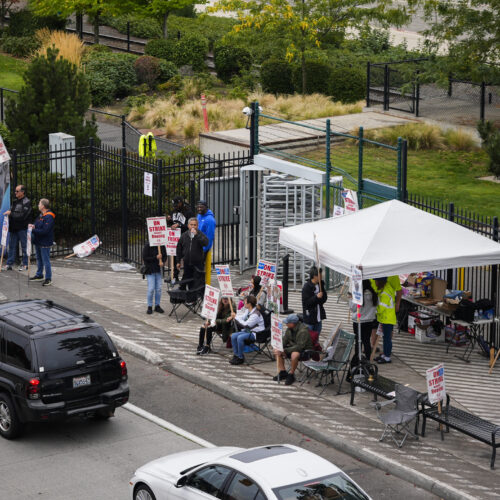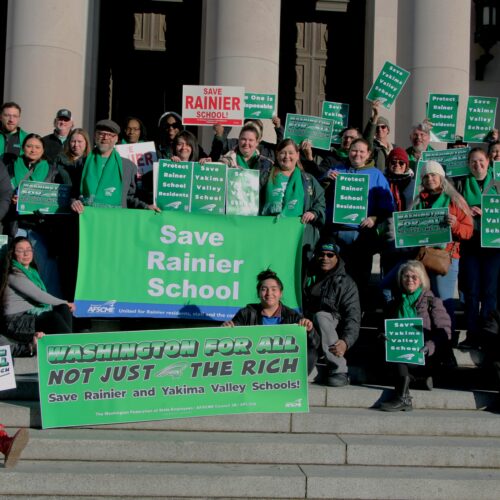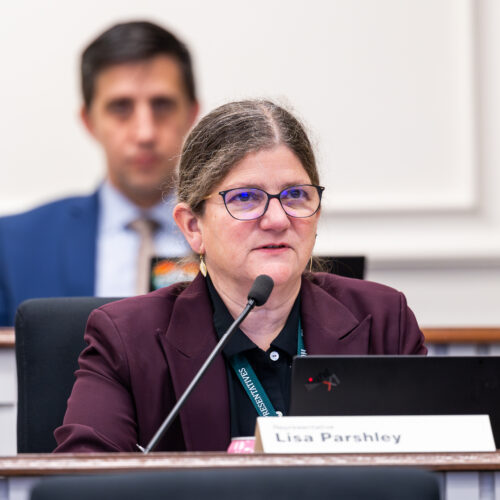
5 Things To Know About Washington’s 2022 Legislative Session

Read
What a difference a year makes at the Washington state Capitol.
A year ago, a chain link fence, National Guard members and scores of state troopers surrounded the Capitol in an unprecedented show of defensive force. The temporary bulwark and troop deployment was a response to the January 6 pro-Trump mob attack on the U.S. Capitol, a major security breach that same day at the governor’s residence in Olympia and threats by far-right groups to occupy the state Capitol, which was closed to the public due to the pandemic.
Today, the fences and troops are long gone and the Capitol campus is largely back to its normal, accessible self. The Capitol building has also reopened to the public.
But some things remain the same. COVID-19 is still raging and, like last year, the legislative session will once again take place mostly remotely — at least to start. That means virtual committee hearings, public testimony on bills via Zoom and lawmakers voting from the comfort (or discomfort) of home.
Democrats control both the House and the Senate and they’re playing things very COVID-safe. Minority Republicans think it’s an overreaction and decry the lack of in-person, public access to the process.
So what’s on the agenda?
This year is a short, 60-day election year session. That means once the starting gun goes off on Monday (January 10), it’s a sprint to the finish. Typically, even-year sessions are more focused and less ambitious than odd-year, 105-day budget writing sessions. The short session is an opportunity to update the state’s two-year budget, respond to new crises, address unfinished business from the year before and make fixes to legislation that’s already passed.
This year, though, the session may have some extra oomph given the state’s strong fiscal position (i.e. there’s money to spend) and the need to continue to address fallout from the ongoing pandemic.
Payroll tax for long-term care
To that end, one of the first orders of business for majority Democrats will likely be to hit the pause button on WA Cares, the state’s new long-term care insurance program. The first-in-the nation benefit will provide qualified workers up to $36,500 to spend on services such as in-home care and adaptive equipment. The program is funded by a payroll tax of $0.58 on every $100 earned.
Democrats created the program in 2019, but have since realized workers are not necessarily wild about a new payroll deduction (which was supposed to kick in this month) and don’t necessarily see the value of the benefit, which was scheduled to start in 2025.
To be clear, Democrats are still bullish on the program. It’s estimated that 7 in 10 Washingtonians will need some sort of long-term care in their lifetimes. But the timing of the start of the new tax isn’t ideal given the ongoing pandemic. Also, the program has some flaws Democrats would like to address before it officially launches.
House Majority Leader Pat Sullivan has already pre-filed legislation aimed at delaying the start of the premium assessment until July 2023 – and refunding any premiums employers deduct before the delay is formally implemented. (In December, Gov. Jay Inslee ordered a delay in the state’s collection of the initial premiums until April to give lawmakers time to formally pause the program. Even so, state agencies have said they intend to start deducting the tax from worker paychecks this month because the law still says they must. Some private employers may do the same.) Sullivan’s bill would also make people nearing retirement age eligible for a partial benefit. Currently, someone close to retirement would pay into the program, but never benefit because they wouldn’t meet the requirements to vest.
A separate pre-filed bill would exempt certain categories of workers from the program. This includes: temporary worker visa holders and people who work for a Washington employer, but live out of state. As currently structured, WA Cares is not portable, so workers who live elsewhere can’t use the benefit.
Meantime, some Republicans would like to see the entire program scrapped.
Police reform ‘fixes’
Last year, in response to the murder of George Floyd and other high profile police killings, Democrats passed a series of sweeping and historic police accountability measures. As the laws took effect, police departments said the new rules of the road were handcuffing their ability to respond to non-criminal calls and assist with people in mental health crises.
This year, Democrats are likely to pass what are known as “trailer” or “clean-up” bills to clarify the intent of the police legislation and adjust the rules of engagement.
For example, state Rep. Jesse Johnson, who last year passed a landmark law banning chokeholds and other police tactics, is back this year with a pre-filed bill that aims to clarify a number of issues, including that deadly force can be used in the face of an immediate threat and that physical force can be used to take someone into custody. The bill also explicitly says police should continue to perform “community caretaking functions” and respond to requests for assistance.
Minority Republicans are offering up their own package of what might be viewed as pro-police, get-tough-on-crime bills designed to roll back much of what Democrats passed last year while also stiffening criminal penalties.
“The substantive package of legislation is aimed at undoing some of the confusion and harm created by the reckless, ill-conceived and dangerous policies adopted by the majority party in Olympia last session,” Republicans said in a press release previewing their proposals.
Besides changes to what Republicans call “anti-police” measures passed last year, their proposals would target rising violent crime, get tougher on drug-related crimes, respond to the epidemic of catalytic converter thefts and keep people in prison longer.
Boost in state spending
Despite the ongoing pandemic, Washington finds itself in strong fiscal shape. In fact, the state’s projected surplus over the next four years is around $8 billion. And that doesn’t include additional savings from a decline in mandatory spending items. Some Republicans are calling for tax cuts. But Democrats seem more inclined to increase spending in targeted areas.
At least that’s what Gov. Inslee did in his proposed $4 billion supplemental budget which he unveiled in December.
Inslee prioritized more money to address homelessness, reduce poverty, aid salmon recovery and combat climate change. He also funded pay increases for state employees. He did not, however, propose tax cuts.
Legislative Democrats will actually write the supplemental budget and have some early ideas of their own.
For instance, Speaker of the House Laurie Jinkins has signaled the Legislature may expand income eligibility for the new working families tax credit. She’s also mentioned a proposal to create a low-interest student loan program. Meanwhile, Republican leaders are pushing for something that’s historically been anathema to Democrats — dedicating some of the state’s general fund revenue to transportation.
“This is a once in a lifetime opportunity to reform our transportation system,” Senate Republican Leader John Braun said at a legislative preview forum sponsored by the Associated Press.
The bottom line is: with money on hand (including those unspent federal relief dollars) and the state continuing to combat a number of COVID-related crises, Democrats are likely to approach the supplemental budget — as Inslee did — as an opportunity to boost spending in some key areas.
Homelessness and housing
In addition to spending more to address the state’s growing and seemingly intractable homelessness crisis, Inslee has pitched a policy change that has the potential to trigger a donnybrook between the state and cities.
With Washington nearly a quarter-of-a-million housing units short, the governor wants the Legislature to pass a law that tells cities they must allow duplexes, triplexes and other types of “middle housing” in neighborhoods currently zoned for single-family residences.
Now, this isn’t a new idea in the Legislature. What is new is that the governor is now making it one of his priorities. That gives it some additional heft.
Specifically, Inslee’s proposal would require large cities to allow multi-family housing on all lots within half-a-mile of major transit centers. In addition, large and midsize cities would have to allow “lot-splitting” on all lots.
“Passing a new statewide policy to allow a variety of ‘middle housing’ types in our cities is one of the most impactful things we can do to restore housing supply and encourage affordable homeownership,” Inslee’s budget office said in a briefing paper.
Inslee has lined up a pair of legislative Democrats to sponsor this “governor request” proposal. Depending on how this plays out, it could trigger a high profile and high stakes battle over local control that some will view as the state bigfooting cities. Others will see it as an “about time” intervention on the part of the state.
Climate action
Last year was a big year for Inslee and his climate agenda. Majority Democrats passed a cap-and-trade bill and a low carbon fuel standard — policies Inslee had long championed. This year, the governor wants to build on those wins and Democrats in the Legislature seem on board.
Inslee’s 2022 priorities include proposals to “decarbonize” buildings, offer new incentives for people to buy electric cars and create a state office of climate commitment accountability.
The governor this year is also asking the Legislature to approve a sweeping update to the state law that governs the approval process for large energy facilities.
Under the governor’s proposal, the state would align its energy facility evaluation process with Washington’s broader aim of reducing carbon emissions. Specifically, the legislation would create a streamlined review process for clean energy projects that meet the state’s carbon reduction goals.
While the governor’s proposal would address big energy projects, Democratic state Sen. Reuven Carlyle of Seattle wants to address smaller sources of carbon emissions – namely landscaping equipment. He’s proposing up to $200 in rebates for consumers to replace their gas powered lawn mowers, leaf blowers and other polluting landscaping equipment with battery operated devices.
Odds and ends
Last year, majority Democrats voted to ban the open-carry of firearms (and other weapons) on the Capitol Campus and at demonstrations elsewhere in the state. This year, there are bills to prohibit guns at election facilities and at school board meetings, and to allow local governments to ban weapons in city buildings and at public meetings.
In another sign of the times, Inslee is proposing legislation to make it illegal for elected officials and candidates to make false statements about election results, if those statements are likely to incite lawlessness. It could be a first-in-the-nation law if it gets any traction this year.
Other issues to watch include: more COVID-19 aid for schools, efforts to address workforce shortages (especially in healthcare), and (no joke) whether to designate pickleball the official sport of Washington.
Like last year, the remote nature of the session will no doubt reduce the volume of bills that ultimately pass.
Here are some handy links if you want to get involved in the process:
This is the main legislative web page.
Here is where you can find legislative committee schedules.
If you want to testify remotely, this link will allow you to sign up.
And if you want to follow my legislative session coverage, bookmark this link.
Related Stories:

Striking workers in Washington could get access to unemployment claims if bill passes
A proposed bill that would give striking workers some access to the state’s unemployment benefits is getting closer to becoming law in Washington.
Majority lawmakers in the House Committee on Labor & Workplace Standards moved the bill out of committee on Friday, with a recommendation to pass it. This, after the bill narrowly passed the senate with 28 yeas and 21 nays earlier this month.

State considers closure of residential facilities for people with disabilities
Ever since he started working at Rainier School in Buckley, Washington, Willis McNabb has been hearing that the state was going to close it. This time, he said it feels more real.
“I’ve never been so worried as I am today,” McNabb said.
Since 1991, McNabb has worked at Rainier, which gives people with intellectual and developmental disabilities a place to find community, learn, work and receive comprehensive health treatment.

Washington bills attempt to give public workers power to bargain on AI
There are only so many things employees get to have a say over in their jobs. Which laptops or messaging app your office uses might not be your call.
For a while, decisions on the use of technology in the workplace have been up to management for public workers in Washington state, thanks to a law passed in 2002. But now, some lawmakers want to pass an exemption that would allow public sector employees to bargain on one broad and ever-changing technology — artificial intelligence.















